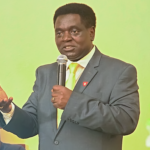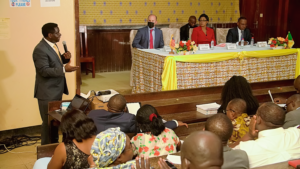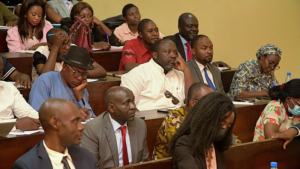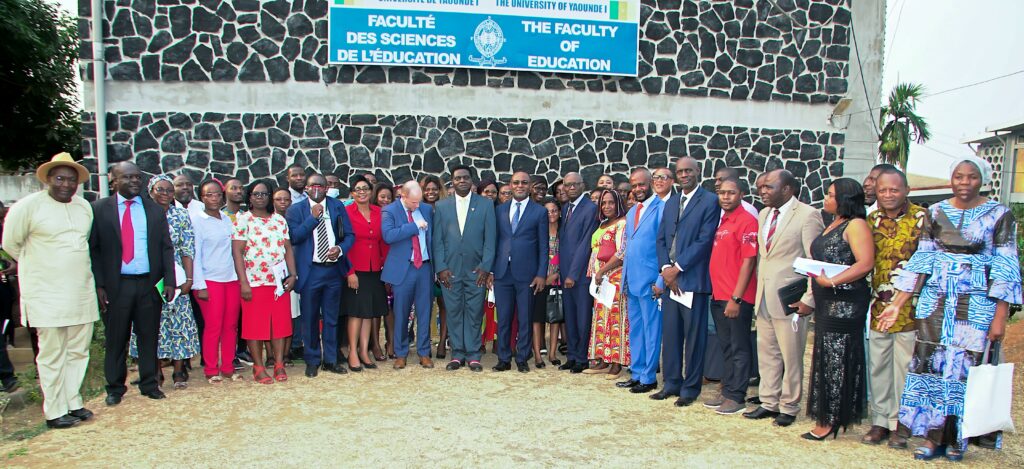On Tuesday 22nd February 2022, a conference took place in the amphitheatre 225 of the Faculty of Education on the theme Higher Education for Sustainable Socio-Economic Growth: Cultivating 21st Century Skills.
The conference commenced at exactly 2:25 pm with the arrival of conference officials; being the Dean of the Faculty of Education, Pr. Bela Cyrille Bienvenu, the Conference Speaker, Pr. Michael T. Ndemanu, the Cultural Affairs Specialist for the American Embassy in Cameroon, Mr. Etan Tabor, and the Moderator, Dr. Teneng Patience epse Bame. The program of the conference was presented and the floor was given to the Dean for a welcome word. In his welcome word, he expressed gratitude for having the Speaker and the Cultural Affairs Specialist of the American Embassy in the Faculty of Education. He indicated that every good turn deserves another and the Faculty of Education shall continue to work in collaboration with the guests of the day. He also expressed the wish for Lecturers, just like students to benefit from the fruits of the new found cooperation in terms of exchange/experience sharing visits, Fulbright studies, publications and co-publications, etc.
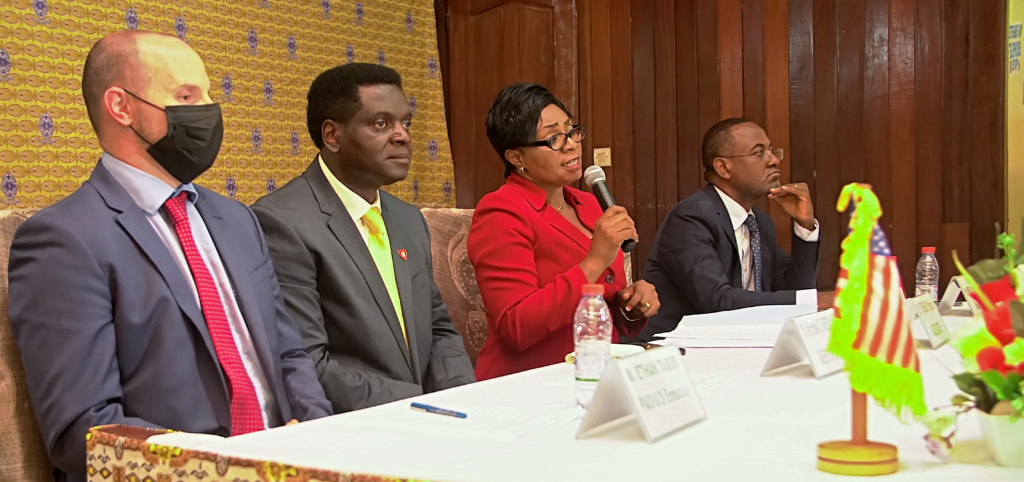
From left to rigth, Pr. Bela Cyrille Bienvenu, the Conference Speaker; Dr. Teneng Patience, Moderator ; Pr. Michael T. Ndemanu, conference speaker; Mr. Etan Tabor
The floor was then given to the moderator to introduce the Speaker, which she did and went ahead to introduce the Cultural Affairs Specialist to the American Embassy that accompanied the speaker in question. The Cultural Affairs Specialist was given the opportunity to say a word and the floor was immediately given to the Speaker for his presentation. The Speaker commenced by indicating that education is his passion and that is why wherever he finds himself around the World he does not hesitate to work towards making sure that education brings about societal transformation. He said that governments of nations are currently paying a lot of attention to education and that is why budgetary allocations for ministries in charge of education are constantly on a rise lately.
His presentation centered principally on knowledge economy; which involves education, information and innovation. In effect, he indicated that the demand for skills is constantly changing and from the year 2002 till date, problem solving skills are mostly demanded. To him, this has led to a consequential change in learning expectations in a way that proficiency, team work, adaptability, communication, innovation, criticism, ability to cross specialist borders, and so on are now the new normal. He reiterated that there is also focused on competency-based graduation; in which case a graduate suppose to be able to appropriately use the skills he/she acquired in school to solve a particular problem. To the Speaker, growth in the knowledge economy manifests itself through a rise in high-tech industries, the service sector, self-employment, and an increase in the number of patents issued. Graduates therefore have to focus on creating initiatives that can help solve societal/humanity problems and by so doing, they will be able to make money too.
He proceeded by proposing some mechanisms that can be put in place to maximize learning outcomes. Here, he indicated that learners have to be competent knowledge workers through creation, innovation and adaptation to exigencies of the changing time. Learning should thus be continuous and learners should participate in the learning process, transfer acquired knowledge in real life situations, do research, do global/diversified learning, etc. Education equally has to be transformative by way of goal-orientation, auto-evaluation, relearning, etc so that the learner can become a knowledge worker. To the Conference Speaker, 21st Century skills are cultivated via learning, literacy, global awareness, life skills, communication and collaboration.
On a conclusive note, the Speaker presented Gross Domestic Product (G.D.P) rates of different continents and countries and indicated that the higher the educational level of a country, the higher its G.D.P rate and vice versa. He posed a question on what higher education graduates need to do so as to narrow the G.D.P gaps of their respective continents/countries and rounded up with a series of “food for thought” questions addressed to students. They centered on: the reason for one to further his/her education; the decision to stand for excellence or mediocrity; the way forward after studies and the added value that acquired knowledge can bring to countries and the world at large.
After the Speaker’s presentation, the moderator took time to make an overview of the presentation and opened the floor for a question and answer session. Questions coming from conference participants centered on investment in education, characteristics of sustainable knowledge, the availability of research infrastructure, how to bridge the training-employment gap, and the type of professionalization that is suitable for Cameroon.
A session was then dedicated for the handing of Pedagogy and Psychology books as a gift from the Cultural Affairs Specialist of the American Embassy to the Faculty of Education. This exercise was immediately followed by the Dean’s closing remark, a family picture and a cocktail.

